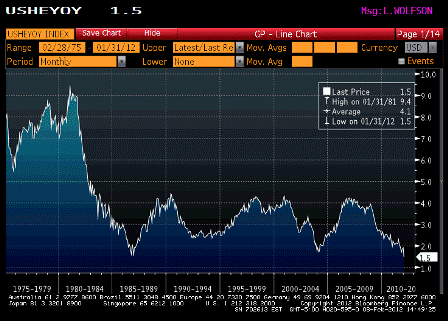Japan traditionally bought $ and built it’s fx reserves to support its exporters.
It was finally Tsy Sec. Paulson who shamed them into suspending their $ purchases by calling Japan, China, and others ‘outlaws’ and ‘currency manipulators’ in what was then, functionally, an attempt at a ‘weak dollar’ policy.
The current administration, however, is on the defensive with regards to the dollar, under attack from political adversaries for allowing the Fed to ‘print money’ and ‘debase the currency’ even as the dollar has been reasonably strong.
So Japan has been testing the waters first with an announced ‘one time’ intervention in response to the earthquake, which didn’t attract the name calling of the prior US administration, and now with the announcement of ongoing intervention.
Seems to me its highly unlikely the US administration will respond negatively which would support their opposition’s ‘currency debasing’ labeling. So I expect Japan to continue to sell yen in an orderly fashion at least until they strike a US nerve.
By Monami Yui and Shigeki Nozawa
Feb 7 (Bloomberg) — Japan used so-called stealth intervention in November as the government sought to stem yen gains that hammered earnings at makers of exports ranging from cars to electronics.
Finance Ministry data released today showed Japan conducted 1.02 trillion yen ($13.3 billion) worth of unannounced intervention during the first four days of November, after selling a record 8.07 trillion yen on Oct. 31, when the yen climbed to a post World War II high of 75.35 against the dollar. The currency’s strength has eroded profits at exporters such as Sharp Corp. and Honda Motor Co., just as faltering global growth undermines demand.
“Japan has clearly shown its intention to stop a further appreciation of the yen, and there is a high chance” for more yen selling, said Hideki Shibata, a senior strategist for rates and foreign exchange at Tokai Tokyo Research Center Co. “Caution against intervention has increased in markets.”
November’s unannounced yen sales were the most effective strategy to weaken the currency, said a Japanese official who spoke to reporters in Tokyo today on condition of anonymity. Finance Minister Jun Azumi said he won’t rule out any options to curb the yen’s appreciation and that he will take action whenever necessary.
Exporting ‘Nearly Impossible’
His comment came a week after Sharp, Japan’s largest maker of LCD panels, forecast its worst annual loss since its founding a century ago, with its president saying exporting is “nearly impossible” with the strong yen. Panasonic Corp., Japan’s biggest appliance maker, forecast a 780 billion yen loss, the worst since the Osaka-based company was established in 1918.
Honda, the nation’s third-largest automobile maker, forecast on Jan. 31 net income for the 12 months ending March will decline to a three-year low of 215 billion yen. The company estimates its operating income is cut by 15 billion yen for every one yen gain against the dollar.
The Bank of Japan last month lowered its forecast for economic growth to 2 percent in the year starting in April from an October estimate of 2.2 percent, citing a slowdown overseas and the stronger yen.
The U.S. Treasury Department criticized Japan in a December report for unilaterally selling its currency in August and October, saying the Asian nation should focus on steps to “increase the dynamism of the domestic economy.” Intervention is an option if the yen moves excessively, Naoyuki Shinohara, a deputy managing director at the International Monetary Fund, said in an interview in Tokyo on Feb. 3.
U.S. Criticism
“Coming under growing criticism from overseas, Japan couldn’t openly intervene in the markets,” said Junichi Ishikawa, an analyst in Tokyo at IG Markets Securities Ltd. “Japan had to choose stealth intervention from the very few options to deal with increasing pressure within the country.”
Intervention is defined as “stealth” when it’s done without any finance ministry announcement, he said.
The yen sale in October was the biggest intervention on a monthly basis in data going back to 1991, while sales totaled 14.3 trillion yen in 2011, the third-largest annual amount, ministry data also showed.
No New Tactics
“We do not believe that the intervention over a period of several days by Japanese authorities signals a significant shift in tactics compared to previous interventions,” Osamu Takashima, Issei Suzuki and Todd Elmer, foreign-exchange strategists at Citibank Japan Ltd. in Tokyo, wrote in a note to clients today. “Investors may be inclined to sell into any renewed bout of intervention on USDJPY on a breakdown beneath recent range lows.”
The first intervention of 2011 was a 692.5 billion yen sale on March 18, when the Bank of Japan led a coordinated effort with Group of Seven nations to counter a jump in the yen after a record earthquake struck Japan a day earlier, stoking speculation companies would repatriate overseas assets to pay for rebuilding. Current Prime Minister Yoshihiko Noda, who was finance minister at the time, ordered the nation’s central bank to intervene again unilaterally on Aug. 4.
The yen reached 76.03 per dollar on Feb. 1, the strongest since Oct. 31. It traded at 76.72 as of 2:33 p.m. today in Tokyo.

